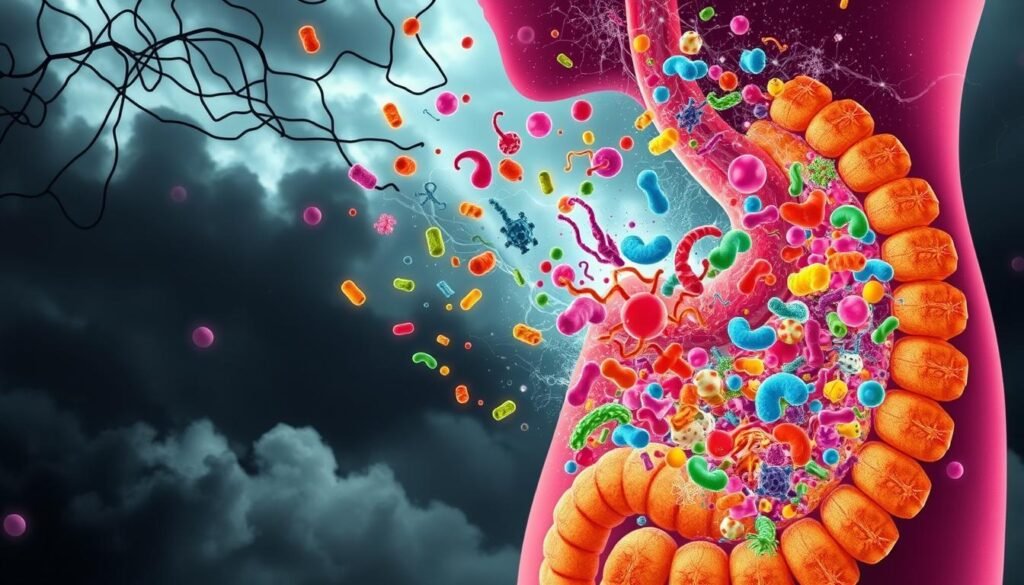Did you know up to 70% of people with irritable bowel syndrome (IBS) also feel very anxious or depressed? This fact shows how closely our emotions and stomach problems are linked. It’s called the gut-mind connection. In our busy lives, stress can lead to digestive issues like nausea and bloating. So, we wonder: does anxiety cause bloating? It’s important to learn how stress affects our body. This knowledge helps us handle stress and its physical effects better.
Key Takeaways
- The gut-brain connection plays a crucial role in both mental and digestive health.
- Individuals with IBS often experience higher levels of anxiety and related symptoms.
- Stressful experiences can significantly disrupt the digestive process.
- Understanding the relationship between anxiety and bloating can inform effective coping strategies.
- Maintaining gut health is paramount for emotional well-being.
- Research supports the benefits of psychotherapy for those experiencing digestive issues linked to anxiety.
The Connection Between Anxiety and Digestive Health
There’s a deep link between how we feel and our digestion. The gut-brain axis makes sure our brain and belly talk to each other. When we’re stressed, our brain’s “fight or flight” mode kicks in. This releases cortisol, which messes with how our gut works.
Feeling anxious can lead to bloating, stomach cramps, and feeling sick. Stress can make us breathe faster, swallowing more air. This can make our stomachs swell up. Also, our bowel habits might change, creating a cycle where anxiety and gut problems feed off each other.
Stress also changes what we
want to eat. People often crave more carbs when they’re worried or stressed. Eating like this can upset our gut’s balance. It can cause gas and more bloating.
But it’s not all bad news. Knowing about this link can help us deal with stomach issues better. Using meditation, talking therapies, eating better, and trying natural fixes like ginger can help. If these issues persist, seeing a doctor is a smart move.
Understanding the Gut-Brain Axis
The gut-brain axis is a complex network linking our gastrointestinal system and brain. It shows how feelings can change our gut health, moving between our body and mind states. The enteric nervous system (ENS), our gut’s “second brain,” has over 100 million nerve cells. These cells are key for digestion and our moods.
About 30% to 40% of people face functional bowel issues sometime. Among them, many with irritable bowel syndrome (IBS) feel more depression and anxiety. Scientists are studying how our digestive system’s activity affects our thinking and memory.
Nerve signals, gut hormones, and microbiota work together for our metabolic health. They help avoid diseases like type 2 diabetes. Surprisingly, our gut makes over 95% of serotonin, crucial for mood, appetite, and sleep. When gut microbiota is off balance, it can lead to mood problems. This shows the gut-brain axis’s role in mental health.
Many don’t know that gut-brain connection issues are often called Disorders of the Gut-Brain Interaction (DGBIs). Symptoms include stomach pain, bloating, constipation, diarrhea, and indigestion. These highlight how our digestive and emotional health are connected.
Recent studies show probiotics might help ease IBS symptoms and related anxiety or depression. One small study found a specific probiotic decreased symptoms in just six weeks. Plus, a prebiotic called galactooligosaccharides reduced the stress hormone cortisol. This suggests diet strategies could help tackle emotional impact on gut health.
| Factor | Impact on Gut-Brain Axis |
|---|---|
| Gut Microbiota | Influences mood and anxiety levels |
| Serotonin Production | Regulates emotional well-being |
| Digestive Disorders | Heighten psychological distress |
| Probiotics | May alleviate gut-related anxiety symptoms |
| Prebiotics | Can reduce stress hormone levels |
Building healthy habits for gut microbiome balance can improve psychological health and wellbeing. Seeing the gut-brain axis guides us towards taking care of our mental and digestive health together.
Can Anxiety Cause Bloating?
Anxiety has a big impact on gut health. Many people feel symptoms like a nervous stomach, leading to discomfort. Understanding how stress causes bloating helps us see why anxiety makes our stomachs upset. It’s also linked to cramping and changes in how often we go to the bathroom.
Nervous Stomach Symptoms
A nervous stomach can feel different for everyone. It can be a little uncomfortable or really bother you. The main signs are:
- Bloating
- Abdominal cramping
- Changes in bowel habits
When we’re stressed, our body can react in a way that leads to bloating. This is known as psychosomatic bloating. The way anxiety and our gut are connected is complex. It really affects our everyday lives.
Fight or Flight Response and Digestion
Being stressed triggers our body’s fight-or-flight response. This affects our digestion. Stress makes cortisol levels go up. Then, our body focuses on the most important functions and not on digesting food. Blood flow moves away from the gut. This causes gut problems. It also makes bloating and discomfort worse.
How Stress Leads to a Bloated Stomach
Stress affects our health a lot, especially causing a bloated stomach. High stress can make your cortisol levels go up. This hormone is tied to getting more belly fat. A study done in 2018 showed a clear link between high cortisol and more fat around your organs. This can make your waistline bigger.
Having too much visceral fat is bad. It’s related to serious health problems like asthma, cancer, and heart diseases. If you’re stressed all the time, you might have issues with your stomach. Stress can stop your digestion. This leads to bloating, sharp stomach pains, and feeling sick.
Not sleeping enough can also cause issues. Sleeping less than 6 hours or more than 9 can increase visceral fat. Eating healthy foods like fruits, veggies, and whole grains helps avoid gaining weight. It also helps manage stress and bloating.
Anxiety can link to Irritable Bowel Syndrome (IBS), making stomach issues worse. You might also feel your heart beating fast and your muscles tightening along with stomach pains. It’s important to see how these are connected.
Relaxation, exercise, and eating mindfully can help with bloating from stress. Handling emotional eating and breathing well improves your stomach health. Using diet changes, probiotics, and herbal teas can also help lessen bloating.

| Strategy | Description | Benefits |
|---|---|---|
| Moderate Exercise | Engaging in regular physical activity | Reduces visceral fat and promotes digestive function |
| Mindful Eating | Focusing on the eating process and sensations | Enhances awareness of hunger cues, reducing overeating |
| Relaxation Techniques | Practicing meditation, deep breathing, and yoga | Decreases anxiety levels, improving digestive health |
| Balanced Diet | Incorporating fruits, vegetables, and whole grains | Supports weight management and gut health |
| Probiotics | Consuming beneficial bacteria to enhance gut flora | Reduces bloating and aids digestion |
Mental Health and Digestion: A Two-Way Street
The link between mental health and digestion is complex, showing a deep connection. Emotional trouble can upset your gut function. Also, how your gut feels can really affect your mood. A key player in this is serotonin, with over 90% found in the gut. This shows how it directly impacts our mood and digestion.
The Role of Serotonin in Gut Health
Serotonin helps us feel happy and is crucial for good digestion. When serotonin levels are off, digestive problems can arise. These issues include trouble absorbing nutrients and moving food through the gut. Studies suggest that changes in gut serotonin can affect our brain and gut nerves. This shows the close link between the mind and gut health.
People with mental health issues often have gut problems like bloating. For instance, about 80% of people with IBS also struggle with anxiety or depression. Stress can make these problems worse, leading to conditions like gastritis and food intolerances. Stress triggers a ‘fight or flight’ response, speeding up digestion and causing discomfort.
Adding probiotics and mindful practices can help your gut and mood. Methods like meditation and yoga can improve both mental and gut health. These practices offer positive results for our overall wellbeing.
The Impact of Stress on Gut Function
Stress greatly affects how our gut works, leading to many digestive problems. The connection between stress and gut health involves both physical changes and issues with gut bacteria.
Changes in Blood Flow and Motility
When we’re stressed, our body sends blood away from the gut to handle the stress. This change affects our gut’s movement, causing constipation, bloating, and discomfort. Being stressed out all the time makes these problems worse.
It adds to psychological stress too. Over time, these issues can turn into chronic gut problems.
Gut Microbial Imbalance
Stress also impacts our gut’s bacteria, creating imbalances. These imbalances can trigger dysbiosis. Dysbiosis may lead to conditions like irritable bowel syndrome (IBS), causing pain and changes in bowel habits.

Gastrointestinal Anxiety Symptoms
Anxiety often shows itself through our bodies. It leads to various stomach issues that can mess with our day. Many people feel stomach pain, get bloated, or have diarrhea when stressed. It’s key to spot these signs and see how they link to anxiety. This helps us handle them better.
Physical Manifestations of Anxiety
The link between our nerves and stomach health is tricky to understand. Research tells us that stress can cause stomach pain or discomfort for 20 to 40% of folks at some time. Those with anxiety might also have unexplained stomach issues. Conditions like irritable bowel syndrome and acid reflux often appear alongside anxiety. Knowing about these stomach problems can help us see how stress affects our digestion.
Coping Mechanisms for Stress-Induced Bloating
Finding ways to deal with bloating from stress is vital for those with stomach anxieties. Let’s look at some tips:
- Exercise: Staying active for 30 minutes a day can boost gut health and mood. This might help with bloating.
- Stress Management: Methods like meditation, breathing exercises, and therapy can lower anxiety and stomach issues.
- Dietary Adjustments: Eating foods that are good for your gut, like probiotics and high-fiber options, helps. Cutting down on processed and fatty foods is also a good idea.
- Smaller Meals: Smaller, more regular meals can ease symptoms and make your stomach feel better.
By using these strategies, folks can manage how anxiety affects their stomach health better.
Natural Remedies for Anxiety-Related Bloating
Managing anxiety and bloating can include natural and diet changes. These help calm the digestion and tackle anxiety’s root causes. Knowing which foods upset your stomach is key to feeling better, both inside and out.
Dietary Adjustments
Dietary adjustments can greatly reduce bloating. Start by tracking what you eat to find what causes discomfort. Stay away from foods like cruciferous vegetables, beans, and some fruits that can bloat. Instead, try potassium-rich and fiber-filled foods like bananas, ginger, and probiotic yogurt to ease your stomach.
Eating 14 grams of fiber per 1,000 calories is also advised. And, don’t forget to walk or do light exercise after eating. This helps prevent gas build-up.
Probiotics and Gut Health
Adding probiotics to your diet is a great remedy for anxiety-induced bloating. They balance your gut’s good bacteria, often upset by stress. Probiotics have shown to help with bloating. Eating probiotic foods or taking supplements can make your digestion smoother and ease anxiety-related bloating.
If you still feel bloated after making these changes, it might be time to see a doctor. They can check for other health issues. For more info, check out this article.

Therapies to Alleviate Anxiety and Bloating
To help with anxiety and bloating, many therapies can be tried. These methods aim not just to reduce anxiety but also to solve stress-related stomach problems.
Among the most successful are cognitive behavioral therapy and practicing mindfulness.
Cognitive Behavioral Therapy (CBT)
Cognitive behavioral therapy provides a clear way to change how we think and react to stress. It helps people understand what makes them stressed. Then, they can learn how to deal with stress without upsetting their stomach.
Using CBT also helps people control their anxiety, which improves their stomach health. Research shows CBT can lessen anxiety’s effects on the gut.
For tips on dealing with stress-related bloating, checking out these coping strategies could help.
Mindfulness and Meditation Techniques
Mindfulness and meditation also fight anxiety-related stomach issues well. These practices help us relax and connect better with our bodies. This reduces stress, which then reduces bloating.
Adding simple mindfulness or guided meditation to your day can make managing anxiety easier. Also, being more in control emotionally, thanks to mindfulness, is good for your gut.
Trying these techniques, along with other methods, offers a full approach to improving overall health.
| Therapy Type | Benefits | Application |
|---|---|---|
| Cognitive Behavioral Therapy (CBT) | Identifies stressors; develops coping mechanisms | Weekly sessions with a therapist; self-guided exercises |
| Mindfulness Practices | Reduces stress; improves emotional regulation | Daily meditation; mindfulness apps |
Food Choices and Their Emotional Impact
Eating right affects both your mind and gut health. Carbohydrates are especially key in this link. The correct types and amounts can boost your mood. But, making poor choices may increase anxiety or stress.
The Role of Carbohydrates in Gut Health
Healthy carbs impact gut health by working with the gut-brain connection. This happens through the vagus nerve. Good carbs like whole grains support a healthy gut balance. This balance is needed for making serotonin, a mood-improving chemical. On the other hand, bad carbs like sugars can cause inflammation and anxiety.
Emotional Eating and Bloating
Stress or boredom can lead to emotional eating. This often results in picking foods that cause bloating. People may choose high-sugar or high-fat foods, worsening digestive problems such as IBS or heartburn. It’s important to recognize the cycle between emotional eating and bloating to break it. Using mindfulness or identifying triggers can help ease the discomfort linked to these emotional reactions.
Focusing on both emotional and physical health together is key. Professional help can guide you through the complex food and emotion connection. It helps in finding better ways to cope, improving wellness. For more on emotional eating, check out this link. Also, to understand how stress affects your gut, visit this source.
Conclusion
The link between anxiety and bloating is becoming clearer. Many studies show how they are connected. A lot of people, especially women and those with stomach problems, often feel bloated.
This issue is made worse by anxiety. Anxiety messes with the gut-brain connection. It can lead to a bloated stomach and discomfort caused by stress.
Knowing how anxiety contributes to bloating helps people find ways to deal with it. It’s important to take care of your mind and stomach health. You can lessen bloating by making some lifestyle and diet changes.
Managing stress and relaxing more can help stop the cycle of anxiety and bloating. Doing this can really improve your daily life.
Both anxiety and bloating can be managed with the right steps. Getting help from doctors or support groups can make a big difference. They help you understand your symptoms better and find ways to solve them.
There are effective ways to relieve the discomfort that anxiety and bloating bring. Finding these solutions can lead to better health and happiness.